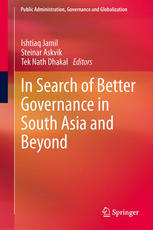

Most ebook files are in PDF format, so you can easily read them using various software such as Foxit Reader or directly on the Google Chrome browser.
Some ebook files are released by publishers in other formats such as .awz, .mobi, .epub, .fb2, etc. You may need to install specific software to read these formats on mobile/PC, such as Calibre.
Please read the tutorial at this link: https://ebookbell.com/faq
We offer FREE conversion to the popular formats you request; however, this may take some time. Therefore, right after payment, please email us, and we will try to provide the service as quickly as possible.
For some exceptional file formats or broken links (if any), please refrain from opening any disputes. Instead, email us first, and we will try to assist within a maximum of 6 hours.
EbookBell Team

4.0
96 reviewsThe pursuit for better governance has assumed center stage in developmental discourse as well as reform initiatives of all organizations working for the public welfare, and includes such issues as service delivery and responding to citizens’ needs and demands. In the era of globalization, multilevel and new modes of governance are changing the traditional governance models of nation states, accelerated by technological innovation, rising citizen expectation, policy intervention from international and multilateral donor communities, and the hegemony of western ideology imposed on many developing nations. However, a universally accepted and agreed upon definition of 'governance’ still remains elusive. There is no consensus or agreement as to what would be the nature and form of governance and public administration. The question that is raised: Is there a universal governance mechanism that fits in all contexts or governance mechanisms should be based on home grown ideas?One can see various programs and policies of reforms and reorganizations in public administration in the developing countries, but these efforts have not been effective to address the challenging issues of economic development, employment generation, poverty reduction, ensuring equality of access to public services, maintaining fairness and equity, security and safety of citizens, social cohesion, democratic institution building, ensuring broader participation in the decision making process, and improving the quality of life. Therefore, there is a widespread concern for better governance or sound governance to bridge the gap between theory and practice, making this book of interest to academics as well as policy-makers in global public administration.